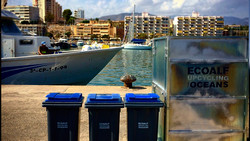Fashion on the high seas: turning marine waste into high-end clothing
Ecoalf, a Spanish SME that designs and markets high quality textile products and accessories made from recycled materials such as PET bottles, discarded fishing nests, used tyres, post-consumer coffee and post-industrial cotton, aims to expand its range to include fabrics and clothes made from marine plastic litter. An EU-funded feasibility study, entitled UPCYCLINGTHEOCEANS, was launched to analyse the economic feasibility of this initiative, identify logistical challenges to obtaining marine plastic litter and to carry out a survey among clients and distributors to assess market reaction. ‘Our objective is to develop production technologies using sophisticated R&D processes to recycle debris from the ocean floor,’ explains project coordinator Paloma Oñate from Spanish SME Ecoalf. ‘We want to create the first generation of recycled products form marine debris with the same quality, design and technical properties as the best non-recycled products.’ In order to realise this ambition, the EU-funded study underlined the importance of coordinating with fishing organisations. As a result, Ecoalf has met with various industry leaders, and agreements are now in place with regional organisations in Valencia. ‘Ecoalf’s intention now is to collaborate with fishing organisations to collect plastic from seas, and to introduce new industrial processes including waste management, pellet production and fabric spinning from recycled material,’ says Oñate. The study also found that a lack of waste collection points at ports has severely hampered attempts at marine recycling in the past. ‘An integral system of waste management therefore needs to be put in place in every harbour,’ says Oñate. Another key issue the study identified was the need for a training plan to be devised in order to promote a culture of waste collection among fishermen. ‘Fishermen are pulling up a huge amount of plastic, but have been throwing it back into the sea simply because this is what has been done for generations, says Oñate. ‘But with the help of these fishermen, we can give this waste a second use.’ Indeed, reusing debris and waste from the sea will create new opportunities for SMEs and have a positive impact on the environment. Plastic – a non-biodegradable disposable material – has begun to seriously pollute oceans across the globe. ‘Miniscule plastic pieces have been scattered by the oceans’ currents,’ says Oñate. ‘These micro-plastics have a structure that due to their small size, concentrate contaminants like sponges along with other chemical pollutants.’ This noxious material is currently not collected, while most waste caught up in nets is simply thrown back into the sea. The environmental benefits of this initiative are not just limited to the removal of a primary source of marine pollution. The manufacturing of PET thread from recycled materials – rather than from non-renewable raw materials –means 20 % less water waste, 50 % less energy consumption and a 60% reduction in air pollution production during the production process. ‘Also, if this petroleum-based waste were removed from the ocean, it would end up in a dump or incinerated, which would cause emissions that are harmful to the environment or result in contaminated land waste,’ adds Oñate. For further information please visit: ECOALF website
Countries
Spain



